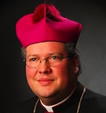
Prime Bishop Anthony Mikovsky
Who Do You Say That I Am?
On the upcoming Twenty-first Sunday in Ordinary Time we hear our Lord and Savior, Jesus Christ, direct a question to His disciples in the Gospel reading for the day.
“Now when Jesus came into the district of Caesarea Philippi, He asked His disciples, ‘Who do people say that the Son of Man is?’ And they said, ‘Some say John the Baptist, but others Elijah, and still others Jeremiah or one of the prophets.’ He said to them, ‘But who do you say that I am?’ Simon Peter answered, ‘You are the Messiah, the Son of the Living God.’ And Jesus answered him, ‘Blessed are you, Simon son of Jonah! For flesh and blood has not revealed this to you but My Father in heaven.” (Matthew 16:13-17)
During the past few weeks we have heard our Lord and His teachings through a number of parables regarding the Kingdom of God. We have had to spend some serious time in contemplation on what exactly we are to understand about the operation of the reign of Jesus around us and in the world. Then as we read about the miracles of Jesus, we must have the same sort of consideration. We must look into these miracles with the same intent as we did the teachings of Jesus. These miracles tell us something about the reign of God and the action of the Lord Jesus Christ within our lives.
But now after all of this, standing within the city of Caesarea Philippi, our Lord asks His disciples, and us through them, “But who do you say that I am?” A little background to this gospel might help us to get to the bottom of the question that Jesus is asking. This town was named Caesarea in the time following the birth of our Lord. When Jesus was born, Herod the Great was the political leader of the Jews throughout the area. Following his death the kingdom was split into four pieces, and this area was ruled by his son Philip. It was Philip who named the city Caesarea to honor the Roman Emperor and therefore Caesarea Philippi means Philip’s Caesarea. Within this town there was also a temple to honor the Emperor known as the Augusteum. One can imagine that while seeing what was occurring there in Caesarea Philippi with the worship of a purely human person, Jesus is contrasting this by asking the disciples, “Who do you say that I am?”
When the answer comes from Simon Peter that Jesus is, “the Messiah, the Son of the Living God,” it is given as a counter to what is surrounding the disciples in this town. They will not put their faith and give their loyalty to any human, no matter how powerful or influential they may be. In stating that our Lord and Savior Jesus Christ is the Messiah, the Son of the Living God, they are stating that He will be placed first within their lives. His teachings are not just good ideas then, but rather divine instruction. It is only upon Him that they will rely as they continue the mission that Jesus has laid out for them as His followers.
It is then with this understanding that Jesus replies to Simon Peter: “And I tell you, you are Peter, and upon this rock I will build My Church and the gates of Hades will not prevail against it.” (Matthew 16:18) And while some have seen within these words a special and unique ministry given to St. Peter, rather, speaking with many of the Fathers of the Church, we see that the rock that Jesus speaks of is the confession that Simon Peter had just made asserting that Jesus is, “the Christ, the Son of the Living God.”. As one example we hear from St. Augustine who said in his work, “The Retractions:” “I so explained what the Lord said: ‘You are Peter, and upon this rock I will build my Church,’ that it be understood as built upon Him whom Peter confessed saying, ‘You are the Christ, the Son of the Living God.’” Likewise John Chrysostom tells us in Homily 54 on the Gospel of Matthew: “Therefore [Jesus] added this, ‘And I say unto you, you are Peter, and upon this rock will I build my Church,’ that is, on the faith of his confession.” On this confession then of Jesus as the Christ, the Messiah, the Savior, Son of the living God, we place our trust, our faith and our loyalty.
Within our world today though, these statements should also give us some pause for reflection. During the days of our Lord, there were certainly many who took the Roman Emperor as a divine figure and put their trust in him even though as a mere human he could not save them. While in our world today we might not have that same kind of devotion to a political figure, there are certainly many things or many ways of life that are vying for our devotion. We can fall prey to our own greed and avarice by believing that if we have the latest car, or phone, or clothes, or whatever else that item may be, we will finally have some peace, contentment and security within our lives. The thing is that it’s never true. We need to be able to answer the question for each and every one of these items, “What role does this fulfill for me?” Or maybe to follow the example of Jesus, “What do you say this item is?”
This exercise will show us that we can still enjoy the blessings of modern life without becoming a slave to it. We can examine our relationship with the things of the world and make sure that we are not turning these things into idols. And rather we can contemplate the question of our Lord Jesus Christ, when He asked “Who do you say that I am?”
So my brothers and sisters of our Holy Church, I ask you, in the days and weeks to come, what is the answer to that question? Is our Lord someone that you only turn to when you desire or want something? Do you go to Church just because you think that you must or because it has become a habit? Or is Jesus really the one for whom you can say, ‘He is the Christ, the Son of the Living God?’ And then also live your life in accord with that confession.
The answer is vitally important because it determines who and what rules each and every moment of your life. Do you follow Jesus, or someone or something else? It is certainly my hope and prayer that as we come through this season of understanding the ways and work of the Kingdom of God and the reign of Jesus in the world, we will truly understand what exactly is at stake. The issue is where do we stand in relation to the true Savior of the world and all creation? The issue is, are we with and for Christ or with and for something else?
My brothers and sisters, as we have spent time in understanding the teachings of Jesus on the Kingdom and Reign of God, as we have encountered Him in His miracles, let us now confess that Jesus truly is “the Christ, the Son of the Living God.” And also let us realize that in and through this confession, we will receive the contentment of a life of security in knowing that Jesus is with us and one day we will be with Him as well.
For Jesus tells us to be concerned about ranking anything ahead of Himself: “Therefore do not worry, saying ‘What will we eat?’ or ‘What will we drink?’ or ‘What will we wear?’ For it is the gentiles who strive for all these things and indeed your heavenly Father knows that you need all these things. But strive first for the kingdom of God and His righteousness, and all these things will be given to you as well.” (Matthew 6:31-33)
So confess, believe and be loyal to Jesus, Who is the Christ, the Son of the Living God. Seek the reign, the way and the will of God on earth. “Let your gentleness be known to everyone. The Lord is near. Do not worry about anything, but in everything by prayer and supplication with thanksgiving let your requests be made known to God. And the peace of God, which surpasses all understanding, will guard your hearts and your minds in Christ Jesus.” (Philippians 4:5-7)

